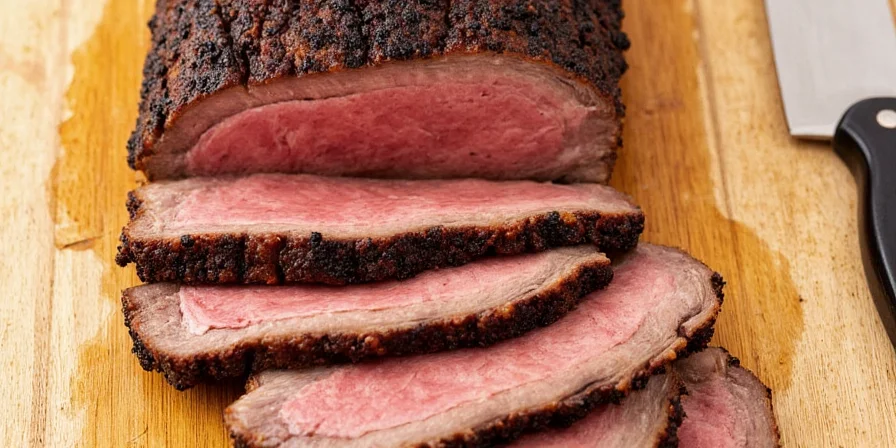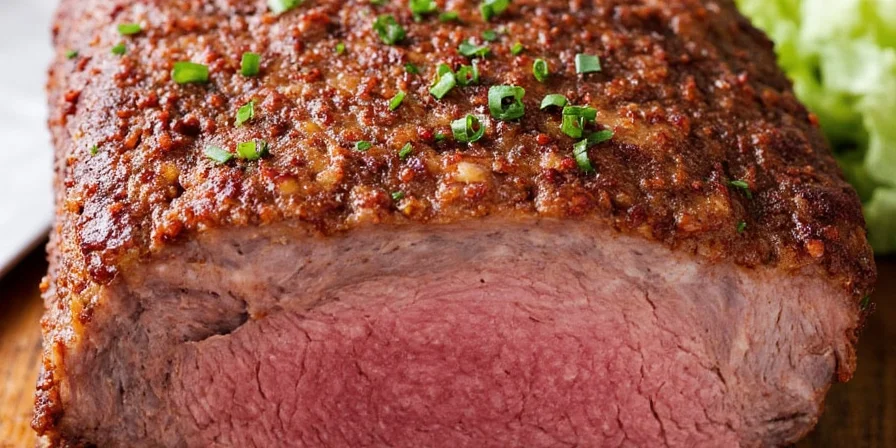Brisket Perfection: The Spice Game-Changer You Never Knew You Needed

If you've ever tried to cook a brisket and ended up with something that tasted like a dry, overcooked slab of meat, you're not alone. Brisket is a beast of a cut, and getting it right can be a bit of a culinary rollercoaster. But here’s the good news: the secret to a fall-apart-tender, flavor-packed brisket lies not in the cooking method alone, but in the spices you use. And that’s where things get really interesting.
Let’s dive into the world of spices, specifically the ones that make your brisket not just edible, but unforgettable. And along the way, we’ll uncover some spice storage and usage hacks that will change the way you approach your kitchen forever.
The Brisket Spice Powerhouse: What You Need to Know
When you think about brisket, you might imagine a dry rub with salt and pepper, or maybe a simple marinade with garlic and onion. But the real magic happens when you layer in the right spices. Let’s take a look at the key spices that make a brisket shine.
1. Smoked Paprika
Smoked paprika is the unsung hero of brisket seasoning. It adds a rich, smoky depth to the meat without overpowering the other flavors. The smokiness complements the natural fattiness of the brisket, creating a complex flavor profile that’s hard to resist.
2. Garlic Powder
Garlic is a staple in any kitchen, and garlic powder is a game-changer when it comes to brisket. It adds a deep, savory note that enhances the richness of the meat and helps the other spices stick better to the surface.
3. Onion Powder
Onion powder is another essential ingredient. It adds a sweet, caramelized flavor that balances the smokiness of the paprika and brings out the natural sweetness in the brisket.
4. Brown Sugar
Yes, even a savory dish like brisket benefits from a touch of sweetness. Brown sugar adds a subtle caramelization during cooking, creating a glossy, flavorful crust on the meat.
5. Black Pepper
Black pepper is the backbone of any seasoning blend. It adds a sharp, pungent flavor that cuts through the richness of the brisket and keeps the dish from feeling overly heavy.
6. Salt
Salt is non-negotiable. It enhances all the other flavors and helps draw out moisture from the meat, which is essential for creating that perfect crust.
How to Cook a Brisket in the Oven: A Quick Recap
Before we get into the spice storage hacks, let’s take a moment to recap how to cook a brisket in the oven. This will help you understand how the spices play into the overall process.
- Preheat your oven to 300°F (150°C).
- Pat the brisket dry with paper towels to help the spices adhere better.
- Season the brisket generously with your chosen spice blend.
- Place the brisket in a roasting pan or Dutch oven and cook for 2.5 to 3 hours, or until the meat is tender and the fat has rendered out.
- Once cooked, let the brisket rest for at least 15 minutes before slicing.
As you can see, the spices are the first step in this process. They not only add flavor but also help with browning and texture. So, it’s essential to store and use them properly to ensure the best results.
Spice Storage & Usage Hacks: Keeping Your Flavors Fresh
Now that we’ve covered the key spices for brisket, let’s talk about how to keep them fresh and ready to go. Proper storage and usage can make all the difference in the flavor of your dishes.
1. Store Spices in a Cool, Dark Place
Spices are sensitive to heat, light, and moisture. Storing them in a cool, dark place like a pantry or spice cabinet will help preserve their potency and flavor. Avoid storing spices near the stove or in the fridge, as the humidity and heat can cause them to lose their aroma and taste.
2. Use Airtight Containers
Airtight containers are your best friend when it comes to spice storage. They help keep out moisture, light, and air, which can all cause spices to lose their potency over time. Glass jars with tight-fitting lids are ideal, as they are non-reactive and easy to see through.
Here’s a quick table comparing different types of spice containers:
| Container Type | Pros | Cons |
|---|---|---|
| Airtight Glass Jars | Preserve flavor, easy to see, reusable | Can be heavy, may break if dropped |
| Plastic Spice Containers | Lightweight, affordable | May absorb odors, less durable |
| Paper Bags | Cheap, easy to store | Not airtight, prone to moisture and light exposure |
3. Label and Date Your Spices
It’s easy to forget when you last used a spice, and once they’ve been sitting in your cabinet for a while, they can lose a lot of their flavor. Labeling your spice jars with the name of the spice and the date you opened them can help you keep track of their freshness.
As a general rule, most spices are good for about 6 months to a year after opening, but some—like ground cinnamon or nutmeg—can last even longer. Others, like paprika or garlic powder, may start to lose potency sooner.
4. Grind Your Own Spices for Maximum Flavor
If you want to get the most out of your spices, consider grinding them yourself. Whole spices like peppercorns, coriander seeds, and cumin seeds can be ground in a mortar and pestle or a spice grinder. Freshly ground spices release more aroma and flavor than pre-ground ones, which can become stale over time.
Here’s a quick comparison of whole vs. ground spices:
| Spice Type | Whole Spice | Ground Spice |
|---|---|---|
| Flavor | Stronger, more aromatic | Weaker, less intense |
| Shelf Life | Longer | Shorter |
| Usage | Better for long-cooking dishes | Better for quick-cooking dishes |
5. Use Spices in Their Prime
Some spices are better suited for certain types of dishes. For example, smoked paprika is perfect for slow-cooked meats like brisket, while garlic powder is better used in marinades or dry rubs. Knowing which spices to use when can help you get the best results every time.
Here’s a quick guide to using your spices effectively:
- Smoked Paprika: Use in dry rubs or marinades for a smoky, rich flavor.
- Garlic Powder: Add to marinades, dry rubs, or even sauces for extra depth.
- Onion Powder: Great for adding sweetness and depth to savory dishes.
- Brown Sugar: Use in marinades or glazes for a touch of sweetness and caramelization.
- Black Pepper: Sprinkle on top of cooked dishes or use in marinades for a sharp, pungent flavor.
- Salt: Use generously in dry rubs and marinades to enhance all other flavors.
Brisket Seasoning: A Spice Blend Recipe
Now that you know which spices to use, let’s put them together into a simple yet powerful brisket seasoning blend. This is a great starting point, and you can always tweak it based on your taste preferences.
Ingredients
- 2 tablespoons smoked paprika
- 1 tablespoon garlic powder
- 1 tablespoon onion powder
- 1 tablespoon brown sugar
- 1 tablespoon black pepper
- 1 teaspoon salt
Instructions
- In a small bowl, combine all the ingredients until well mixed.
- Pat the brisket dry with paper towels to help the seasoning stick better.
- Generously season both sides of the brisket with the spice blend.
- Place the brisket in a roasting pan or Dutch oven and cook in the oven as described earlier.
Spice Storage: A Visual Guide

As you can see, a well-organized spice cabinet is a thing of beauty. Not only does it look great, but it also makes it easier to find the spices you need when you’re cooking. Here are a few tips for organizing your spices:
- Group similar spices together, such as all the savory spices in one area and the sweet spices in another.
- Use clear labels so you can easily identify each jar.
- Keep frequently used spices in easy-to-reach places.
- Store spices in airtight containers to keep them fresh.
Final Thoughts: Spice It Up and Enjoy the Results
Brisket is a cut of meat that rewards patience and attention to detail. And when it comes to detail, the spices you use are just as important as the cooking method itself. By choosing the right spices, storing them properly, and using them with care, you can transform a simple cut of meat into a culinary masterpiece.
So next time you’re in the kitchen and you’re looking for a way to elevate your brisket, don’t forget the power of spices. They might be small, but they can make all the difference.
Happy cooking, and may your brisket always be tender, flavorful, and perfectly seasoned!










 浙公网安备
33010002000092号
浙公网安备
33010002000092号 浙B2-20120091-4
浙B2-20120091-4